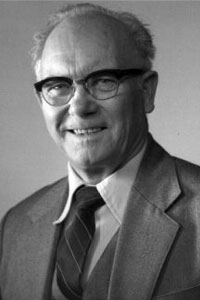Dr. Henry Heard Marshall (D.Sc.,P.Ag.), a Manitoban of great prowess, spent his career working in the field of horticulture. He married (Eva) Genevieve Evangeline Foresman, on October 26, 1940 and they raised four boys. As a self-taught scientist, Henry’s research was not restricted to a field of specialized training but rather expanded as he studied the problems of different crops. Whether it was vegetable, fruit, ornamental flower or shrub, he approached it as a challenge. His depth of interest was broad, ranging from chemistry, to genetics, to colour, to essential oils, to the genetics of sweetness. He trained himself in statistics, botany, and genetics, often to the level attained only through advanced university degrees. Mr. Marshall’s interests included such studies as geology, history, and fauna.
His major accomplishments as a plant breeder have helped make Henry Marshall’s name well-known throughout Canada and even abroad. Henry studied native local hardy plants and crossed them with more tender but showy varieties. It was this strategy that led to some dramatic advances in plant breeding. Over forty introductions in several genera, many of which continue to be widely grown today, attest to the impact of Henry’s work. For example, he started with the native prairie rose, Rosa arkansana, crosses were made between this hardy parent and the less hardy floribunda roses. The first generation cross, Assiniboine, was a stepping stone to the later improved cultivars such as; Cuthbert Grant, Adelaide Hoodless, Morden Cardinette, and Morden Centennial. Particularly in roses, the Parkland series has been the single most important advance in quality and hardiness for the prairie region. Four of Henry’s cultivars outsell all other roses combined, and have received the Award of Merit.
Mr. Marshall made a botanical study of the flora of the Pembina Hills. He has been a contributor in other fields as well. Henry served in the Brandon and Morden United Church as Director and Sunday School Superintendent. He was President of the Morden and District Museum, Director, and Councillor for the Central Region of the Manitoba Museums Association, and as Director of the Manitoba Heritage Federation.
Henry possessed the gift of a brilliant mind and a sense of level headedness. He was a man of many talents, equally at home with executive affairs, and practical skills. His work has been appreciated by friends, co-workers, and agrarians.


